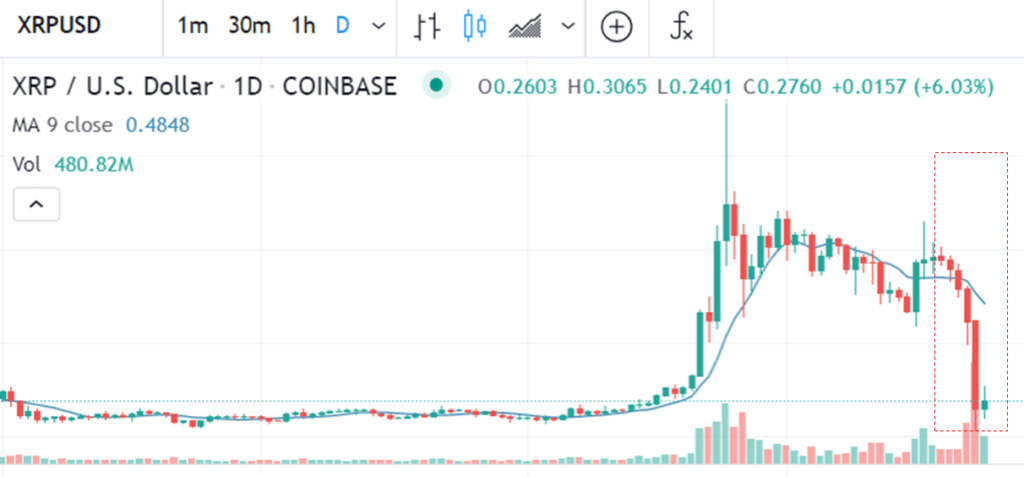After-effects of SEC charges against Ripple

The Securities and Exchange Commission (SEC) announced on Tuesday it has filed the lawsuit against Ripple Labs Inc. and two of its executives – Ripple CEO Brad Garlinghouse and cofounder Chris Larsen- for raising over $1.3 billion through an unregistered, ongoing digital asset securities offering.
In response, Brad Garlinghouse, the CEO of Ripple, said he would aggressively fight and prove the case. Garlinghouse emphasized that he has the option to individually settle with the SEC, but decided not to take that route. The long-lasting question on if XRP is or is not security will be concluded in the final court decision.
Since the SEC charges against Ripple, XRP fell as much as 50%, touching the lowest level in the last 5-month period. Many customers, market makers, and partners are evaluating their options.

Bitwise liquidates its position in XRP:
Shortly after SEC sued Ripple and its creators for conducting an unregistered and ongoing securities offering, the Crypto money manager Bitwise liquidated XRP position from its crypto index fund. XRP previously represented 3.8% of the index’s fund allocation. In a press release, the company said:
The Bitwise 10 Crypto Index Fund does not invest in assets that are reasonably likely to be deemed securities under federal or state securities laws. Bitwise’s decision to liquidate its position in XRP was based on consideration of new public information from the SEC’s complaint.
Ripple’s Partner reaction:
While Bitwise was quick to react, major Japanese financial group SBI Holdings doesn’t seem to change course and continues their support for the Ripple. In a tweet, SBI Holdings CEO – Yoshitaka Kitao, said that in Japan, the Financial Service Agency (FSA) “has already made it clear that XRP is not a security,” adding that he is “optimistic that Ripple will prevail in the final ruling in the US.”
Meanwhile, MoneyGram another major Ripple partner said it will continue to monitor for any potential impact as developments in the lawsuit evolve. In the press release, the company said as a result of recent SEC charges against Ripple, it is yet to see any “negative impact” on its longstanding business arrangement with Ripple.
In the complaint filed Tuesday, the SEC alleges that “to encourage adoption of ODL, Ripple paid XRP to both the money transmitting businesses and certain market makers that supported the product for their efforts.” MoneyGram was not mentioned by name in the SEC filing though it did specify that money transmitter earned over $52 million in fees and incentives from Ripple, in an arrangement from 2019 through June 2020.
Interestingly, MoneyGram seems to distance themselves and in the press release clarified that they do not utilize Ripple’s ODL platform or RippleNet and therefore, MoneyGram should not be considered as a party to the SEC action.
Losing market:
While the case could take years to resolve, some experts warn if the SEC proves in court that XRP is a security, many cryptocurrency exchanges would delist XRP. That’s because as of now the majority of crypto exchanges don’t have licenses to deal in securities.
According to the lawsuit filed by the SEC, Ripple entered into agreements with at least 10 crypto exchanges. The lawsuit reads:
In 2017 and 2018, Ripple also entered into agreements with at least ten digital asset trading platforms – none of which were registered with the SEC in any capacity, and at least two of which have principal places of business in the United States – providing for listing and trading incentives with respect to XRP. Ripple paid these platforms a fee, typically in XRP, to permit the buying and selling of XRP on their systems and sometimes incentives for achieving volume metrics.
If the official court decision deems XRP as a security, exchanges are likely to run into the risk of facing penalties for allowing consumers to trade unregistered security. Smaller exchanges such as OSL, Beaxy, and CrossTower have already halted XRP trading or removed XRP entirely from their offerings.


Comments are closed.